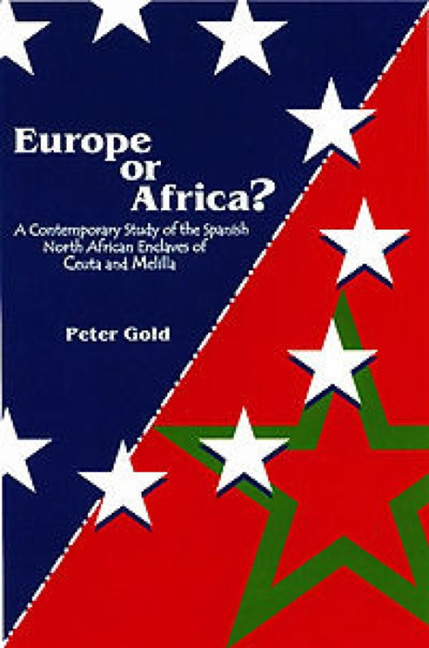Book contents
- Frontmatter
- Dedication
- Contents
- Acknowledgement
- List of figures and tables
- Map
- Introduction
- 1 The impact of the enclaves on Spanish–Moroccan relations
- 2 The enclaves within the Spanish state: the autonomy statutes
- 3 The evolving political landscape in the enclaves
- 4 The 1985 Immigration Law and community relations in the enclaves
- 5 The enclaves: a migration gateway to Europe
- 6 The enclaves: Europe or Africa?
- 7 Gibraltar and the enclaves
- 8 Conclusion: looking to the future
- References
- Index
7 - Gibraltar and the enclaves
- Frontmatter
- Dedication
- Contents
- Acknowledgement
- List of figures and tables
- Map
- Introduction
- 1 The impact of the enclaves on Spanish–Moroccan relations
- 2 The enclaves within the Spanish state: the autonomy statutes
- 3 The evolving political landscape in the enclaves
- 4 The 1985 Immigration Law and community relations in the enclaves
- 5 The enclaves: a migration gateway to Europe
- 6 The enclaves: Europe or Africa?
- 7 Gibraltar and the enclaves
- 8 Conclusion: looking to the future
- References
- Index
Summary
It is scarcely surprising that many parallels have been drawn between Spain's North African enclaves on the one hand, and the British colony (redesignated in 1981 ‘British dependent territory’) of Gibraltar on the other. Just as Morocco wants to negotiate with Spain a transfer of the sovereignty of Ceuta and Melilla, Spain has been pressing (particularly since the early 1960s) for the reintegration of Gibraltar into Spanish territory. The fundamental difference is that the status of the territories held by Spain and Britain on the Mediterranean coast is different in international law: unlike Ceuta and Melilla, whose Spanishness was described in the Introduction, Gibraltar was ceded to Britain in perpetuity by the Treaty of Utrecht of 1713 following its acquisition by force in 1704 during the Spanish Wars of Succession. The Treaty gives Spain the right to first refusal if ever there should be a change of sovereignty over the Rock.
On the grounds that its North African enclaves are not colonies or dependent territories but integral parts of the Spanish state with their own representatives in the national Parliament, Spain has always rejected the suggestion that if it expects Britain to negotiate the transfer of the sovereignty of Gibraltar then it should also expect to have to negotiate the transfer of Ceuta and Melilla to Morocco. But the Muslim descendants of the Sultanate of Morocco and of the Rif tribespeople of northern Morocco would argue that for many years the enclaves had as much of a colonial status as Morocco itself had until 1956, and that they have ceased to be colonies only relatively recently. And if Spain can use the arguments of geographical proximity and territorial integrity to justify its claim to Gibraltar, Morocco can call up exactly the same arguments in relation to its claim to the Spanish enclaves.
The Falklands/Malvinas crisis
At no time were parallels between the enclaves and Gibraltar drawn with more frequency than during the Falklands/Malvinas war of 1982.
- Type
- Chapter
- Information
- Europe or Africa?A Contemporary Study of the Spanish North African Enclaves of Ceuta and Melilla, pp. 158 - 165Publisher: Liverpool University PressPrint publication year: 2000



